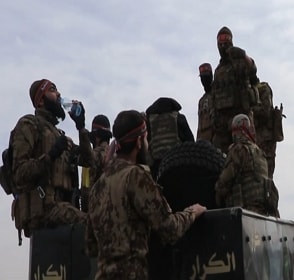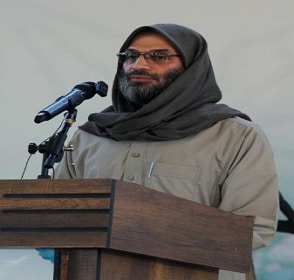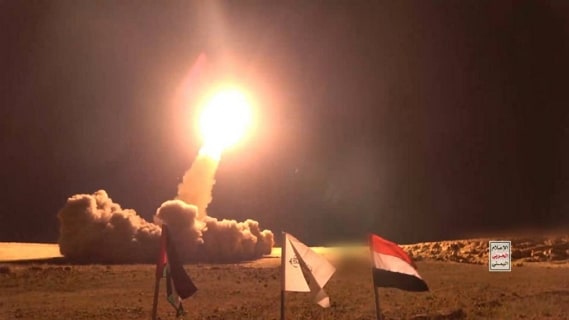On October 21, 2024, Al-Zallaqa, the official media outlet of Al-Qaeda's affiliate in Mali and the African Sahel, Jama'at Nusrat Al-Islam Wal-Muslimeen (the Group for Support of Islam and Muslims – GSIM), released a 26-minute 18-second audio of an interview in Arabic with GSIM Fulani leader Muhammad (Mamadou) Koufa. The interview was conducted by France 24 correspondent Wassim Nasr.
In the interview - his first public media appearance - Koufa responded to 14 questions about the group's jihad, its positions, expansion, strategies, and activities in Mali and Burkina Faso, as well as Benin, Ghana, Niger, and Togo.
On his account on X (formerly Twitter), Nasr said that after two attempts, he managed to send Koufa 17 questions, adding that three of them came back unanswered as of this writing.
"We Fight To Restore The Islamic Rule In Our Land"
Nasr launched the interview by asking Koufa about how he joined the Ansar Al-Din group, and whether this affiliation was a reaction to what is known as the Civil Status Law of 2009 in the context of a secularist constitution.
Koufa said that joining Ansar al-Din group and then GSIM was an answer to Allah's divine command to join jihad and fight the "polytheists" in Mali. There is nothing else, he replied, adding: "The issues of Muslims and their tragedies in Mali and other countries are of greater importance, and are more worthy and deserving of giving and sacrifice than our personal and family issues."
Koufa asserted that Mali has not witnessed any remarkable progress on the social front, noting that Mali, like other Muslim countries, "has not savored the taste of the blessed Islamic law as prescribed in the Quran and the prophet's Sunnah for a long time."
"For this reason, we are fighting this criminal gang that has usurped Allah's right to rule and legislate, and has declared war on Islam and Muslims…We fight to restore the Islamic rule in our land, which the French took upon themselves to fight, before the usurping apostates took over and are fighting the rule of law with all force, injustice, and tyranny."
Koufa: Islamic Da'wa Is A Religious Duty Upon All Muslims, Fulani Muslims Included
Wassim Nasr's second question concerned whether Koufa's transnational influence could be a risky approach that might destabilize the traditional balances within the Fulani communities, inside and outside Mali. In his reply, Koufa, citing religious texts, stressed that Islamic da'wa [preaching] is a religious duty upon all Muslims, including Fulani Muslims.
He continued: "Islamic da'wa has never been a factor for division among people. This has never been the path promoted by preachers…Our approach has never been built on dividing the ranks of people who are brought together by the Quran and the pious Sunnah."
"Fulanis Have Ascertained That There Is No Way For Them To Recoup Their Right But Through Jihad"
Asked about the reason the number of Fulani fighters in GSIM in general, and in the Massina Battalion in particular, has been growing steadily since he joined the group, Koufa said that Fulanis, like other ethnicities, are implementing the call to wage jihad:
"Fulanis, as well as other Muslim ethnic communities, have been estranged in their religion as well as their living. They were alienated and deprived of the sources of suitable livelihood for a time. How would they not rebel against the tyrants and fight them? A fight of those who do not fear death."
He further argued that Fulanis have determined, over time, that there is no way for them to recoup their right to live in dignity but through jihad for the sake of Allah.
"The Crimes Committed By Wagner Group And The Malian Army Exceeded The Crimes And Violations Committed By The French Troops"
Asked by journalist Nasr whether the advent of the Russian Wagner Group (PMC) contributed to the recruitment of Fulanis in GSIM's ranks in central Mali, Koufa argued that the crimes committed by the PMC and by the Malian army exceeded the crimes and violations committed by French troops, although he stressed that the French have not committed certain acts that Wagner operatives had committed.
"It was normal to see the noble and zealous people stand up and champion their religion and defend their honors and wealth from the aggressors," Koufa said.
NGOs Will Not Be Attacked As Long As They Are Not "Weaponized Or Used To Serve The Aspirations" Of Foes
In the fifth question, Nasr asked whether there were norms that regulate attacks against humanitarian organizations, citing documented GSIM attacks in Ansango, Mali, in August 2024, where the group burned villages following clashes with the Islamic State (ISIS in Sahel).
Responding, Koufa asserted that the group's strategy does not allow attacks on NGOs, noting that the group would continue to adhere to its strategy - as long as these NGOs are not weaponized against the group or used to serve the "aspirations" of the group's enemies. Per Islamic law and good reasoning, he added, such practices "must not be overlooked."
Koufa Praised GSIM's Fight Against ISIS Sahel: ISIS's "Evil And Presence Limited To Certain Areas"
In the following question, Nasr asked Koufa about the frenzied clashes between GSIM and ISIS affiliates and how he, as a leader, envisages the future of the confrontations between the rival groups. Fulanis in GSIM continue to form a solid wall blocking ISIS's expansion southward. Meanwhile, ISIS itself continues to recruit among Fulanis.
In his answer, Koufa said that GSIM would not have fought ISIS had it not been for the latter's fanatic approach, holding Muslims to be infidels and taking their lives and property.
Koufa praised GSIM's achievement in this regard, saying that the group managed to break ISIS's force, cut their evil, and shrink their presence to limited areas.
"Should they return to reason, cease their wrongdoing, and repent to their Lord, we will not antagonize them or fight them, and we hope they would do just that," he affirmed.
Again, on the topic of ISIS, Nasr asked whether continuing war with ISIS is inevitable and what is the nature of the sporadic ceasefires achieved in certain areas in Mali and Burkina Faso. In his reply, Koufa stressed that the door for negotiations to settle disagreements is always open for whoever seeks to achieve the interests of Islam and Muslims. He added that what Nasr called "ceasefires" were necessary in some situations.
"The Brothers In Burkina Faso, Headed By Abu Mahmoud [Jaafar Dicko], Are Worthy Of Their Positions And Have Been Doing Very Well"
Another question concerned Koufa's relationship with Jaafar Dicko, commander of the group in Burkina Faso, and the operational relationship with the branch in Burkina Faso. Koufa responded by denying that Dicko had been appointed emir in Burkina Faso given his close relationship to the Emir Iyad Ag Ghaly. Koufa argued that positions of command in Islamic law are not granted based on kinship or personal interests. "Such a rule applies to all positions and at all tiers of command."
Koufa continued, saying that the brothers in Burkina Faso, headed by Abu Mahmoud [Jaafar Dicko], are worthy of their positions and have been doing very well. A clear example, he said, is that they "inflicted upon the criminal ruling gang in Burkina Faso the worst of woes, carrying out daily armed assaults and ambushes."
Koufa Urges Governments In Benin, Ghana, And Togo To Cease Oppressing Peoples And To Stop Fighting Islam And Muslims: "Otherwise, They Will Be Subjected To What You Mentioned, If Not More"
Nasr asked whether the replication of GSIM in Burkina Faso would be repeated in countries like Ghana, Togo, and Benin, given the reports of sporadic attacks in these areas. Koufa praised the group's jihadi achievements in Mali, Niger, and Burkina Faso, saying that the group's jihad established a solid jihadi reality. This should serve as a reminder to rulers in neighboring countries to learn the lesson and cease oppressing their peoples and fighting Islam and Muslims; "otherwise, they will be subjected to what you mentioned, if not more."
"The Rulers In Bamako Will Never Live In Peace As Long As People Across Mali Do Not Live Peace As A Reality"
Asked about his position on political negotiations with the regime in Bamako, and whether talks were still an option following the military actions in northern and central Mali, Koufa reiterated that the group fights those that fight it, and makes peace with those who seek to make peace:
"The rulers in Bamako will never live in peace as long as people across Mali do not live in peace as a reality, and as long as they [the regime in Bamako] have not ceased their crimes and injustices. This will never happen, Allah willing, even if all people killed and our land scorched," he declared.
Koufa Declined To Reveal Future Military Plans, But Promised "Harsh Treatment Of The Enemies Of Allah In Days To Come"
Nasr then asked whether there was any religious judgment behind the increasing attacks on military sites in populated cities in Mali, such as Bamako and Sevare, while avoiding attacks against civilian targets. In response, Koufa again stressed that GSIM's military approach does not allow targeting civilians and that its war targets only combatants, without ruling out the possibility of "mistakes" that occur during combat.
Koufa then apologized, and declined to answer a question about the group's future military plans. However, he promised harsh treatment of the "enemies of Allah" in the coming days.
Niger Issues Remain The Jurisdiction Of The Group's Command In Niger
Nasr asked: "What is your position regarding the military rulers in Niger, knowing that the negotiations with the previous government were smooth, and had positive outcomes on the overall situation, especially regarding thorny topics such as hostages, as example?"
In his reply, Koufa said it was not within his area of expertise to talk about Niger's issues, which remain under the jurisdiction of the command in Niger. He noted that the general rule agreed upon within the group was to cease to fight any party that ceases to fight GSIM.
He also argued that there was nothing "positive," as described in Nasr's question, saying that the current government in Niger had two pathways before them, and that the group would entertain either one the current authorities in Niger wish to take.
GSIM Open To Negotiations That Solve Crises And Safeguard The Interests Of Islam And Muslims
Asked whether GSIM is open to mediation by neighboring countries and whether there is room to discuss security matters relating to prisoner swaps or even broader deals, as happened in Niono, Koufa said that the door for negotiations is open for any party that seeks to solve crises, so long as the discussion "safeguards the interests of Islam and Muslims." He adds that conditions for such scenarios would remain specific to each individual situation.
France's Defeat And Withdrawal Of Troops Is "Great Victory For Muslims"
In his last question, Nasr asked whether the departure of the French troops from the region represented a victory, and whether the presence of French troops in the past would continue to impact French and foreign citizens in Mali.
Koufa considered the departure of French troops a great victory for the Muslim nation, and a "divine punishment" for French leaders who ridiculed Islam and championed the insulters of the Prophet.
"France has to learn the lesson and save what it can in its dealings with Muslims in Africa, especially in the north of the continent. It must cease to provoke them and be unjust to them,” said Koufa.
The full text of this post is available to subscribers.
Please login or register to request subscription information from MEMRI






